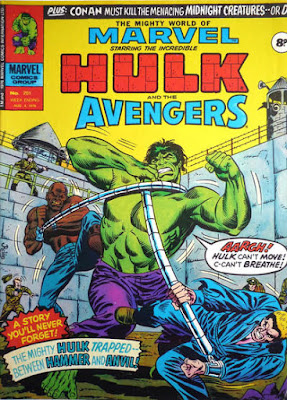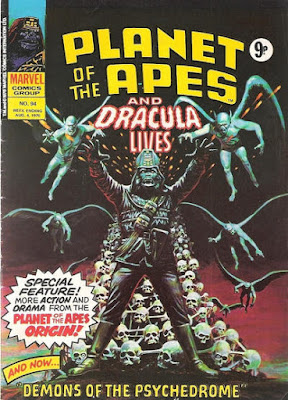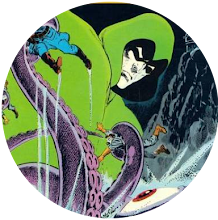Doctor, grab that syringe - because I may be in urgent need of tranquilisers.
Why? Because I'm about to watch a very old edition of Robot Wars Extreme.
But, way back in 1976, we wouldn't have dreamt of watching robots bashing each other up. We were far too busy watching the stars of our favourite comic company bashing each other up instead.
That's the difference between the past and the present. And that's the brave new world of sci-fi Space Ageness we currently inhabit.
You couldn't accuse this of not being a landmark issue. Hammer and Anvil make their fearsome first appearance, Crackajack Jackson makes both his debut and his exit and the Hulk learns how to read and write.
More importantly than all that, I'm pretty sure this is the issue where the Hulk first discovers he likes baked beans.
I do believe this is a tale where the Torch goes on the rampage in the Great Refuge, in an attempt to find Crystal.
I think he might encounter a talking yeti along the way.
Other than that, I can recall little of the tale, other than that the Torch is very annoying in it.
What a striking and memorable cover. You can click here to find out if it made the legendary list of my favourite Planet of the Apes covers way back when I blogged on that very subject.
But, hold on. I detect a 9p price tag, meaning The Mighty World of Marvel is now the only Marvel UK publication that's still available for 8p.
According to the Bank of England's inflation calculator, 9p in 1976 equates to 58p in current prices, while 8p equals 52p.
At the time, 9p equalled 16 cents and 8p equalled 14 cents.
Spidey's still having trouble with the Molten Man.
Even more excitingly, Dr Strange is having trouble with Dracula in a tale drawn with sorcerous style by Gene Colan.
I seem to recollect that tale not having a happy outcome for the good doctor.
Thursday, 4 August 2016
Subscribe to:
Post Comments (Atom)












































































14 comments:
Inflation in the 70s, eh?
Appreciate your efforts to cover economics, Steve, but in your assessment of the rising cost of POTA you neglected to consider why 25 cent US comics only cost 9p here.
And why they cost three or four quid now.
-sean
After due research, I've now discovered that the August 1976 US Marvels cost 25-30 cents but the variants printed for export to the UK had a cover price of 10p. On this day in 1976, 25 cents was worth 14 pence, and 30 cents was worth 17 pence. Quite why the variants designed for export to Britain were so much cheaper than the US ones, bearing in mind the added cost of shipping and, I assume, import tariffs, I have no idea.
I believe the dramatic rise in the price of comics since then is because comics were originally meant to be sold in huge numbers at rock-bottom prices but, by the late 1970s, newsagents were increasingly reluctant to stock them in large numbers because they took up space that could instead be allocated to higher-priced magazines. Faced with having nowhere willing to stock their products, the comic industry therefore switched to a model of selling less comics at higher prices, in order to encourage newsagents and comic shops to keep stocking them. Presumably, the switch to using better quality paper and printing technology and paying creators royalties has also pushed up prices as well.
Ooh! I might have an explanation for the US/UK price discrepancy!
It seems that only about half the comics distributed in America actually officially sold. The rest were returned to the publishers or distributors or simply went missing. So it might be that the cover price was higher in order to cover the cost of the unsold copies. Presumably, copies designed for export to Britain were sold to British importers for an upfront payment. Therefore it might be that the cover price could be lower because it didn't have to cover the cost of unsold comics.
I should point out that this is only a theory that I've just concocted and I don't know if it is the actual reason.
I think may have something there, Steve - under the sale or return system in the 70s a US comic with healthy sales might still only sell half its print run.
Clearly there was a relationship between poor sales and export, at least if the ubiquity of copies of the Invaders or Human Fly in the UK were anything to go by.
Under direct sales, print runs had much better sell through for publishers - no returns - which offset the costs of better printing in the short term.
But I guess sales have declined in the long term...
Naturally, being something of a dangerous commie lunatic, I blame capitalism for the increased cost of comics. You forgot to in the tendency for the rate of profit to fall, Steve!
-sean
Sorry, typo - that last line should say "you forgot to factor in"
-sean
I don't recall noticing the increasing prices until they exceeded to convenience factor of the ten pence piece. 8p = comic plus 2 fruit salads + 3 mojos. 9p = comic plus either 2 fruit salads or 3 mojos. 10p = comic but no fruit salads or mojos, and a vague sense of disappointment. Greater than 10p = whole world of pain...
DW
That should have been "the" convenience factor.
DW
Steve's theory on up front payments in the UK might also explain why we used to see comic racks full of colour Marvel comics on holidays to the seaside. Sometimes the comics were a few years old.
Steve and Dangermash must be on to something. I remember visiting Morecambe in 1980 and being able to buy DC comics published in 1977 in newsagents and in the market. The "upfront payment" theory might also explain getting 1970 Marvel comics in Stranraer in 1973.
Pretty sure UK newsagents stocked American comics on sale or return.
Seems more likely seaside towns had a particular arrangement with the distributors, as a sort of dumping ground for returns that - for obvious reasons - couldn't easily go back to the publishers.
Up front payments for the initial imports would all have been further up the supply chain, surely?
-sean
That Hulk story was indeed the Hulk's introduction to baked beans. I never touch the stuff myself, mind you.
The intestinal havoc baked beans might create in the Hulk's gamma-irradiated bowels might be too much for those purple pants to handle. They're already under a lot of strain.
M.P.
Interesting the comments about US comics in seaside towns. Prior to 81/82 the only time I could find any US editions was on holiday in Devon or Cornwall. Which went someway to making up for horrible weather and enforced Pontins entertainment.
I suspect that the large number of children in seaside resorts must have made it unusually lucrative for shops to sell comics there.
Post a Comment